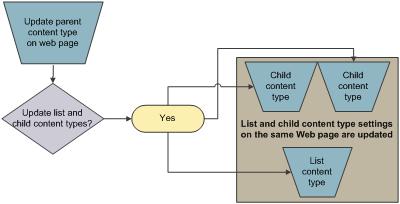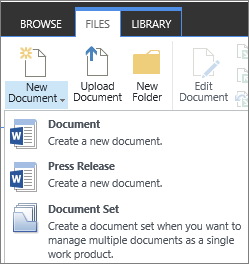Add a content type to a list or library
Applies To
SharePoint Server Subscription Edition SharePoint Server 2019 SharePoint Server 2016 SharePoint Server 2013 SharePoint in Microsoft 365 SharePoint Server 2010When you add a content type to a list or library, site users can use the New Document command to create specialized content quickly.
To add a content type to a list or library
Important: To add content types to a list or library, you must have at least the Design permission level for that list or library. You also need to have multiple content types enabled. For more info, see Turn on support for multiple content types in a list or library.
-
Go to the settings for the list or library.
-
Under Content Types, select Add from existing site content types. If Content Types doesn't appear, select Advanced settings, and select Yes under Allow management of content types?, and then select OK.
Note: If the list or library isn't set up to allow multiple content types, the Content Types section does not appear on the Settings page for the list or library. To learn how to allow multiple content types, see Turn on support for multiple content types in a list or library.
-
To choose the group of site content types you want to select from the Select Site content types from list, select the arrow.
-
In the Available Site Content Types list, select the name of the content type that you want, and to move the selected content type to the Content types to add list, select Add.
-
To add more content types, repeat steps 5 and 6.
-
When you finish selecting all of the content types that you want to add, select OK.
To add a content type to a list or library (modern experience)
In the modern experience, you still need to turn on Allow management of content types to allow multiple content types, but it is easier for you to select the custom content types you want to add to your list or library.
Note: We are currently in the process of making this functionality available to Microsoft 365 customers. If you currently do not see it, it should be available shortly.
-
Go to the settings for the list or library.
-
If Content Types doesn't appear, select Advanced settings, and select Yes under Allow management of content types?. Then select OK.
-
Next, in your document library, select Add Column. In the menu that displays, select Content type. This option was added by turning on Allow management of content types? in the previous step.
-
In the Add Content Type page, select the Choose content type menu, and then select the content type you want to add, from the list of custom content types that can be added.
-
Details about the selected content type will display, such as its description and column information.
-
When you finish selecting the content type that you want to add, select Apply.
-
To add more custom content types, repeat steps 4 thru 6.
This modern experience is currently intended only for custom content types, to make those content types that are specially created by your organization easier to find and add. If you want to also view or add the content types that are available out-of-box in SharePoint, please use the earlier experience.
How content types work in lists and libraries
When you add a content type to a list or library, you make it possible for that list or library to contain items of that type. In addition, users can just click the New Document command to create an item of that type. A single list or library can contain multiple content types, and each content type can have unique metadata, policies, or behavior.
When you add a site content type to a list or library, it is called a list content type. The list content type is a child of the site content type from which it was created. It inherits all the attributes of its parent site content type, such as its document template, read-only setting, workflows, and columns. If the parent site content type for a list content type is updated, the child list content type can inherit these changes. A list content type can be customized for the specific list or library to which it is added. These customizations do not apply to the parent site content type.

If the child content type shares attributes with the parent site content type, those attributes might be overwritten when the list content type inherits changes from the parent. If the list content type has custom attributes that the parent content type does not have, these customizations are not overwritten.
You can specify the order in which content types are displayed on the New Document button for a list or library. By default, the first content type that is displayed on the New Document button becomes the default content type for the list or library. To change the default content type for the list or library, change the content type that is displayed first on the New Document button. You can also specify whether you want content types that were added to a list or library to be visible on the New Document button.

To change the order of items on the New Document menu
-
If the list or library is not already open, on the Quick Launch, select its name. If the name of your list or library does not appear, select Settings

-
On the ribbon, select List or Library.
-
Under Content Types, select Change new button order and default content type. If Content Types doesn't appear, select Advanced settings, and select Yes under Allow management of content types?, and then select OK.
Note: If the list or library is not set up to allow multiple content types, the Content Types section does not appear on the Customize page for the list or library.
-
In the Content Type Order section, do either of the following:

-
To remove a content type from the New Document button for the list or library, clear the Visible checkbox.
-
To change the order in which a content type appears on the New button, select the arrow next to that content type in the Position from Top column. Then, select the order number that you want.
-
-
Select OK.
When you remove a content type from a list or library, users will no longer be able to create new items of that content type inside the list or library. Removing a content type from a list or library does not delete any items that were created from the content type.
Delete a content type
-
If the list or library is not already open, on the Quick Launch, select its name. If the name of your list or library does not appear, select Settings

-
On the ribbon, select List or Library.
-
Under Content Types, select the name of the content type that you want to remove. If Content Types doesn't appear, select Advanced settings, and select Yes under Allow management of content types?, and then select OK.
Note: If the list or library has not been set up to allow multiple content types, the Content Types section does not appear on the Customize page for the list or library.
-
Under Settings, select Delete this content type.
-
When you are asked whether you are sure that you want to delete this content type, select OK.










